I guess we all know this repeated quotation, seen several times in the Book of Revelation. I would like to take a deeper dive into some possible meanings from this quotation. First, as we have discussed many times before, there are often many more meanings to Scripture than the obvious. With the adjacent quotes, “first and last,” or “beginning and end,” we get one more obvious meaning. Is there more to be discerned? We are going on a journey here, which is partly based on the work done by others, and partly on my own research. So, first I will give some background before sharing some findings from my work.
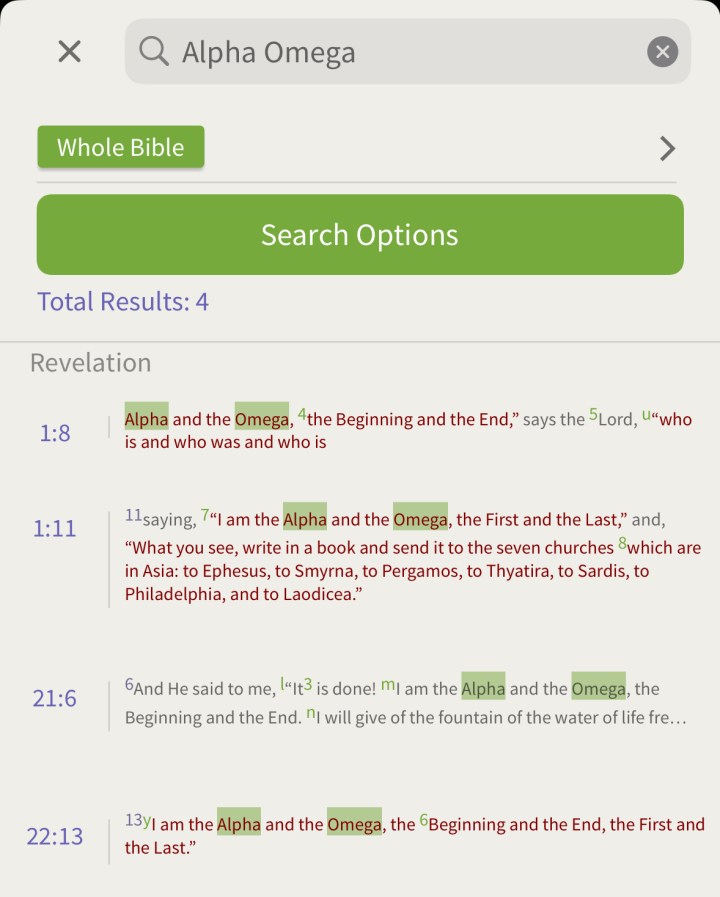
First, you are already aware that the most-used reference in my work the past few years has been the Etymological Dictionary of Biblical Hebrew, based on the commentaries of R. Samson Raphael Hirsch, by R. Matityahu Clark (in the references list). I will continue to use the methods from that reference, but will take a different path from one perspective. The methods gleaned from Clark’s book are true, no matter what number of letters are used in a word. I say there is truth in the method because each individual letter has meaning.The more letters that are combined, the more meanings get added in. The letters are like building blocks and the words are structures made from these blocks. The more blocks/letters, the more complex the structure/meaning. Much of this is review from earlier shares on the website, trying to consolidate here for the present entry.
As you see below, from EDBH, underlined with red, the Jewish technique has centered around the idea of three-letter roots. I still use that fairly widely-accepted concept in my work, and wok backwards from there to find meanings for two-letter words. But before we get into that, I want to be sure you are all aware of others’ work with two-letter words.

I have referred many times previously to Jeff Benner‘s work, based on His archaeological studies and the background of Paleo – Hebrew.

You see from this excerpt from his book, The Ancient Hebrew Lexicon of the Bible, that he begins with Two-Letter Roots, that he calls “Parent Roots,” and then moves to Three-Letter Roots which he calls “Adopted Roots.” I don’t personally recognize well the Paleo-Hebrew figures like he does, so for my simple brain, I have tried to put my work in a format that I (and hopefully you) can better understand. He is a brilliant guy, and I refer frequently to his work.
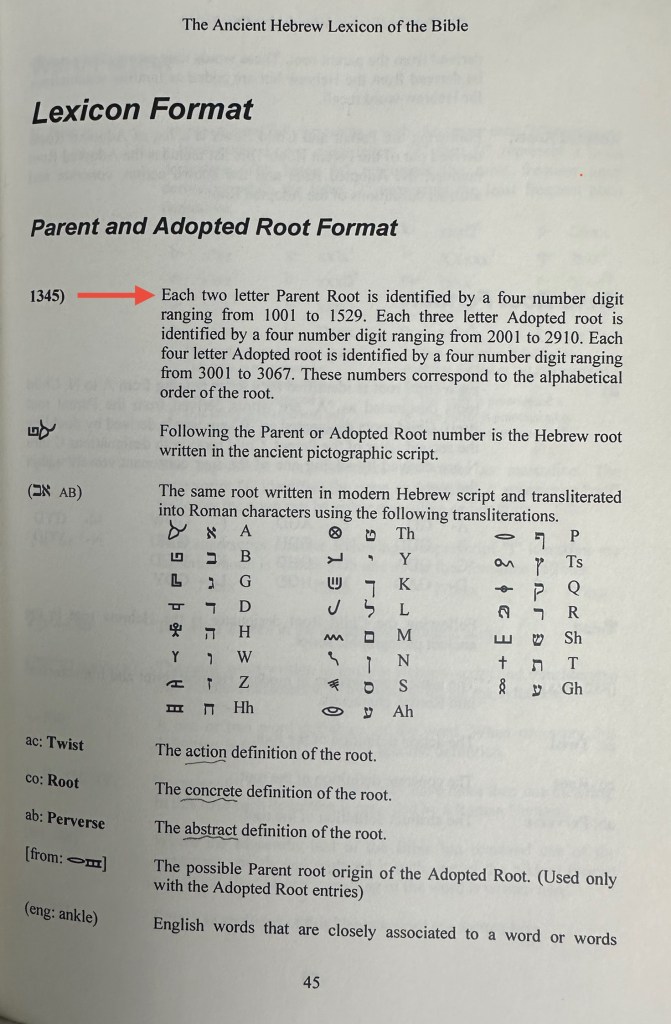
And finally, I have referred to the work previously by Catherine Darnell, and in particular the last phrase in her subtitle, “… with our focus on the Aleph Tavs!” This will be the focus of my work in today’s entry, building upon the work of these experts. We can all only hope to have had others’ work to build upon for whatever contributions we might be able to make.
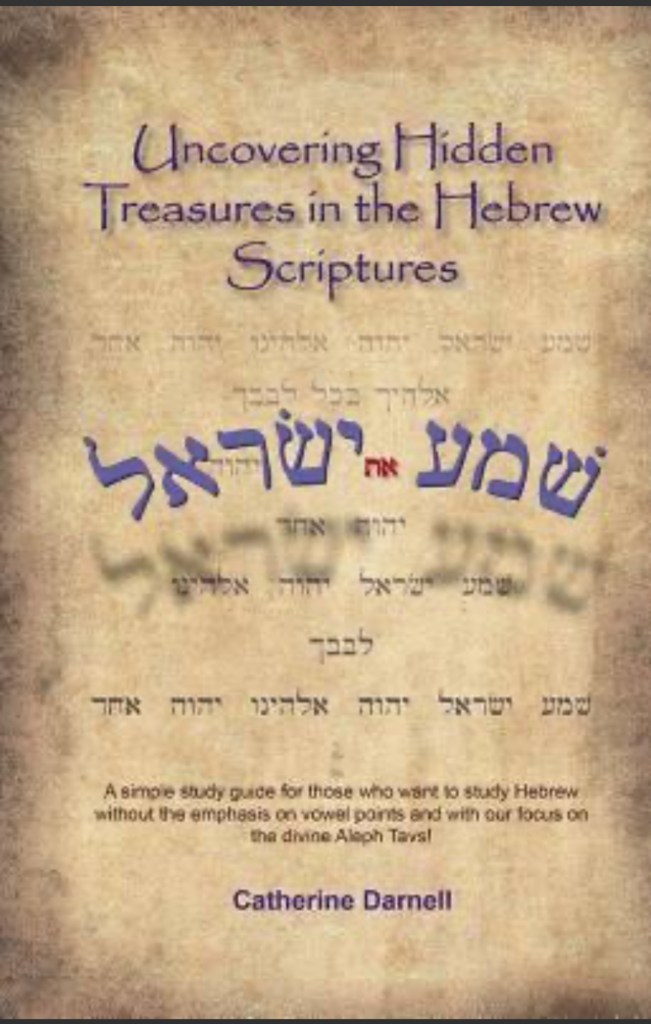
So, as we progress, I will use the cognate permutations method I have derived from my in-depth study of Clark’s book. You will not find the term “cognate permutations” in his book. It is a term I coined, using the methods that are used in his book, which again are based on the commentaries of Hirsch. And, again, I use the more widely-accepted Jewish method of three-letter roots to back-derive meanings for two-letter words (I will show an example). This method should provide meanings in the same “ball park” as Benner’s work, or, using Clark’s wording, p.299, “… words that contain similar consonants have similar meanings irrespective of the order of the consonants.“ We should arrive at “similar meanings.”
The example I share with you here is for the two-letter word מל. It is only to show you how the process works, not for use in the current topic of alpha and omega:

There are 55 roots represented here, more conveniently grouped by Clark using families with similar cognate meanings. There are 27 words or phrases here that are then used to derive the cognate permutation meaning for מל. If you want to look into more depth for את, see the reference below.
“For את/עד/עת cognate permutations, there are 229 roots listed on the spreadsheet.
These are distilled into 45 cognate groups, but with three having duplicate meanings in EDBH, we look at 48 definitions.” This was published back in June of 2023:
Blog 143 The Dance Series ❷ – כל and עת
It is a somewhat tedious process, especially when cross-checking what is in Clark’s book, because there are a number of modifications penciled in to my latest copy of his book due to typos, errors, differing interpretations, items left off, etc. (Remember our “rules of thumb,” which are “don’t trust anybody” and “question everything.”) Still, it is the most helpful reference I know of.
With that as background, I also want to remind you of my previous statement that I believe to be true (warning! My opinion- accept or not.) that Yeshua/Jesus used this method to teach at least his closest followers. I see suggestions of this especially in the Gospel of John. It is only something that one comes to believe/see after working on these methods for multiple hours every day over years. I have no better evidence to show you than what I have already shared, but will continue to share my findings so that you may also see this as a real possibility.
So, now, on to some revealing passages dissected using the את – ΑΩ cognate permutations group. See what is highlighted. And please remember one of my previous comments that for two-letter words, more Hebrew words will be in bold, simply because of fewer letters. Always remember that such words will include the idea of the investigation, but of course will be modified by additional letters/blocks in the structure of the word. ⦁ ▸
⦁ Genesis 2:15-25 NKJV
15 Then the LORD God took the man and put him in the garden of Eden to tend and keep it. 16 And the LORD God commanded the man, saying, “Of every tree of the garden you may freely eat; 17 but of the tree of the knowledge of good and evil you shall not eat, for in the day that you eat of it you shall surely die.”
18 And the LORD God said, “It is not good that man should be alone; I will make him a helper comparable to him.” 19 Out of the ground the LORD God formed every beast of the field and every bird of the air, and brought them to Adam to see what he would call them. And whatever Adam called each living creature, that was its name. 20 So Adam gave names to all cattle, to the birds of the air, and to every beast of the field. But for Adam there was not found a helper comparable to him.
21 And the LORD God caused a deep sleep to fall on Adam, and he slept; and He took one of his ribs, and closed up the flesh in its place. 22 Then the rib which the LORD God had taken from man He made into a woman, and He brought her to the man.
23 And Adam said:
“This is now bone of my bones
And flesh of my flesh;
She shall be called Woman,
Because she was taken out of Man.”
24 Therefore a man shall leave his father and mother and be joined to his wife, and they shall become one flesh.
25 And they were both naked, the man and his wife, and were not ashamed.
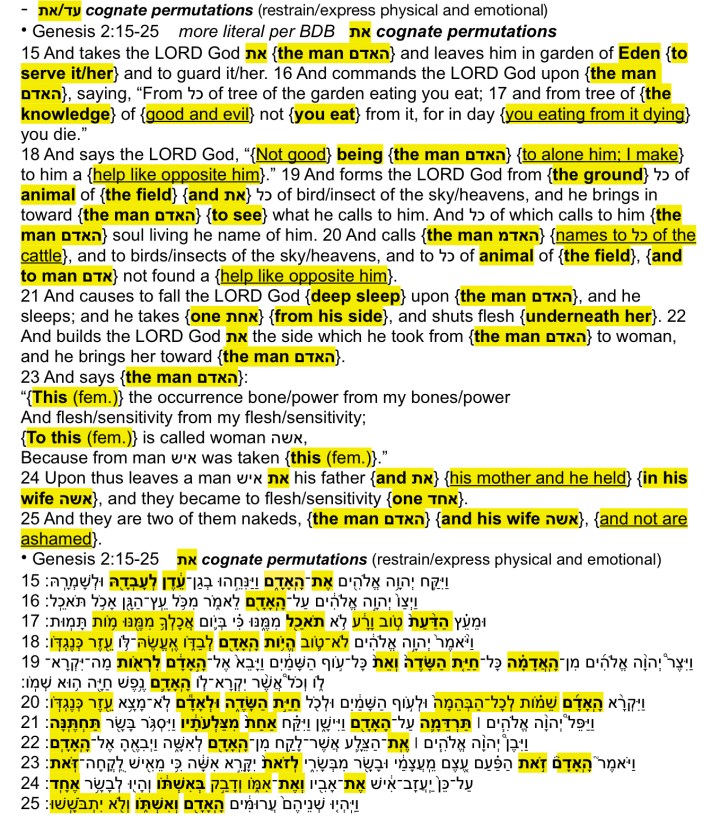
⦁ Genesis 8:21-22 NKJV
21 And the LORD smelled a soothing aroma. Then the LORD said in His heart, “I will never again curse the ground for man’s sake, although the imagination of man’s heart is evil from his youth; nor will I again destroy every living thing as I have done.
22 “While the earth remains,
Seedtime and harvest,
Cold and heat,
Winter and summer,
And day and night
Shall not cease.”
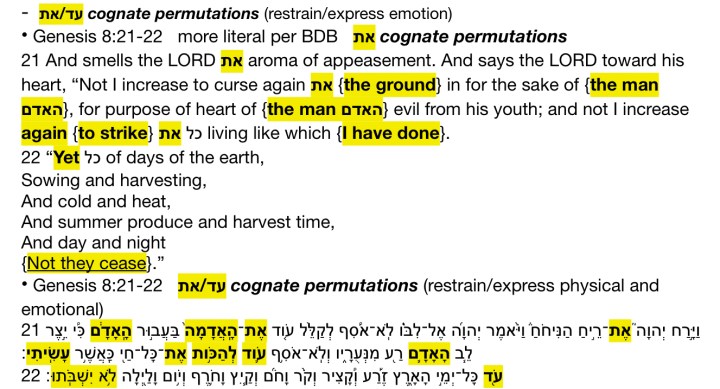
⦁ Genesis 25:23-28 NKJV
23 And the LORD said to her:
“Two nations are in your womb,
Two peoples shall be separated from your body;
One people shall be stronger than the other,
And the older shall serve the younger.”
24 So when her days were fulfilled for her to give birth, indeed there were twins in her womb. 25 And the first came out red. He was like a hairy garment all over; so they called his name Esau. 26 Afterward his brother came out, and his hand took hold of Esau’s heel; so his name was called Jacob. Isaac was sixty years old when she bore them.
27 So the boys grew. And Esau was a skillful hunter, a man of the field; but Jacob was a mild man, dwelling in tents. 28 And Isaac loved Esau because he ate of his game, but Rebekah loved Jacob.
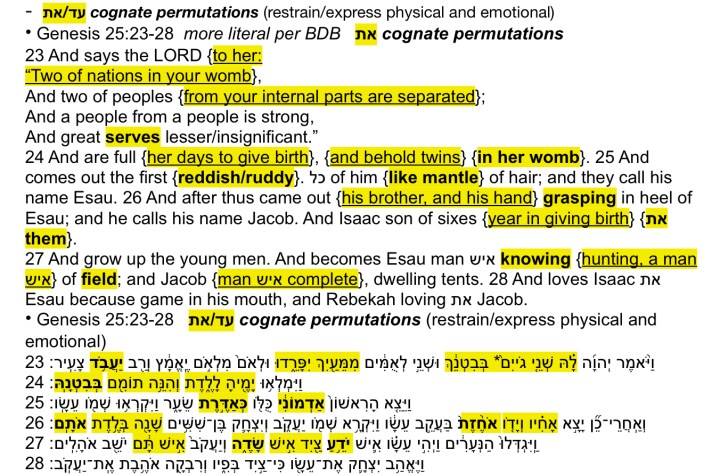
⦁ Genesis 48:15-22 NKJV
15 And he blessed Joseph, and said:
“God, before whom my fathers Abraham and Isaac walked,
The God who has fed me all my life long to this day,
16 The Angel who has redeemed me from all evil,
Bless the lads;
Let my name be named upon them,
And the name of my fathers Abraham and Isaac;
And let them grow into a multitude in the midst of the earth.”
17 Now when Joseph saw that his father laid his right hand on the head of Ephraim, it displeased him; so he took hold of his father’s hand to remove it from Ephraim’s head to Manasseh’s head. 18 And Joseph said to his father, “Not so, my father, for this one is the firstborn; put your right hand on his head.”
19 But his father refused and said, “I know, my son, I know. He also shall become a people, and he also shall be great; but truly his younger brother shall be greater than he, and his descendants shall become a multitude of nations.”
20 So he blessed them that day, saying, “By you Israel will bless, saying, ‘May God make you as Ephraim and as Manasseh!’” And thus he set Ephraim before Manasseh.
21 Then Israel said to Joseph, “Behold, I am dying, but God will be with you and bring you back to the land of your fathers. 22 Moreover I have given to you one portion above your brothers, which I took from the hand of the Amorite with my sword and my bow.”
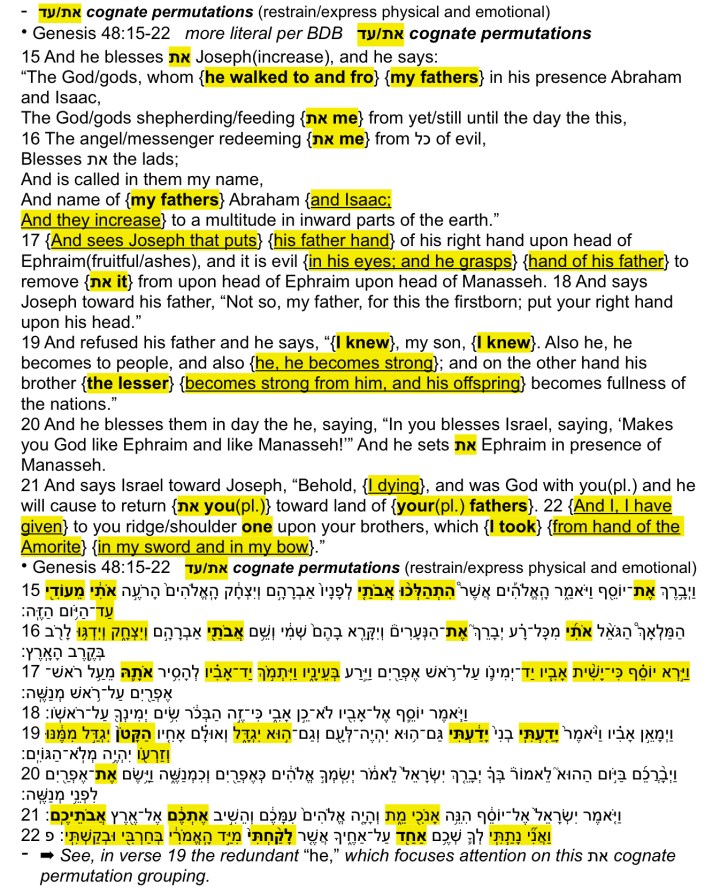
⦁ Deuteronomy 20:1-8 (NKJV – Principles Governing Warfare)
1 “When you go out to battle against your enemies, and see horses and chariots and people more numerous than you, do not be afraid of them; for the LORD your God is with you, who brought you up from the land of Egypt. 2 So it shall be, when you are on the verge of battle, that the priest shall approach and speak to the people. 3 And he shall say to them, ‘Hear, O Israel: Today you are on the verge of battle with your enemies. Do not let your heart faint, do not be afraid, and do not tremble or be terrified because of them; 4 for the LORD your God is He who goes with you, to fight for you against your enemies, to save you.’
5 “Then the officers shall speak to the people, saying: ‘What man is there who has built a new house and has not dedicated it? Let him go and return to his house, lest he die in the battle and another man dedicate it. 6 Also what man is there who has planted a vineyard and has not eaten of it? Let him go and return to his house, lest he die in the battle and another man eat of it. 7 And what man is there who is betrothed to a woman and has not married her? Let him go and return to his house, lest he die in the battle and another man marry her.’
8 “The officers shall speak further to the people, and say, What man is there who is fearful and fainthearted? Let him go and return to his house, lest the heart of his brethren faint like his heart.’
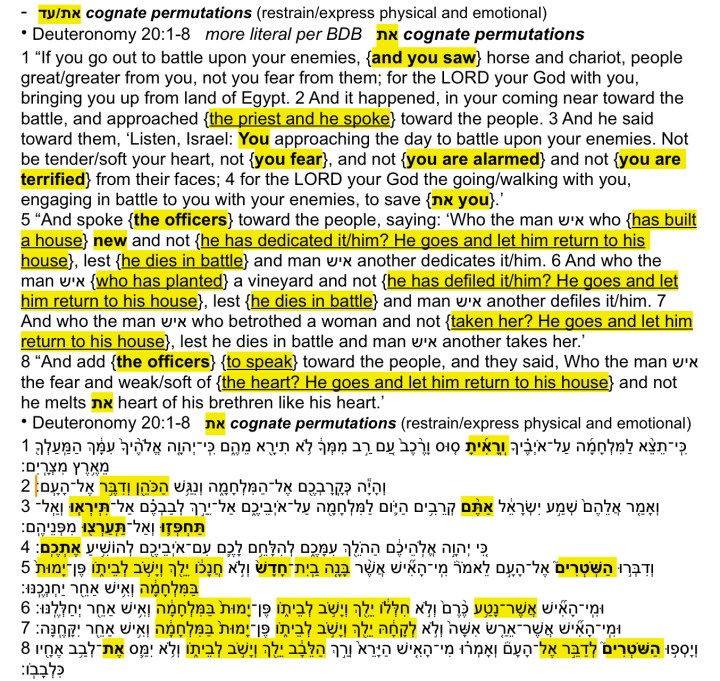
⦁ Job 1:17-21 NKJV
17 While he was still speaking, another also came and said, “The Chaldeans formed three bands, raided the camels and took them away, yes, and killed the servants with the edge of the sword; and I alone have escaped to tell you!”
18 While he was still speaking, another also came and said, “Your sons and daughters were eating and drinking wine in their oldest brother’s house, 19 and suddenly a great wind came from across the wilderness and struck the four corners of the house, and it fell on the young people, and they are dead; and I alone have escaped to tell you!”
20 Then Job arose, tore his robe, and shaved his head; and he fell to the ground and worshiped. 21 And he said:
“Naked I came from my mother’s womb,
And naked shall I return there.
The LORD gave, and the LORD has taken away;
Blessed be the name of the LORD.”

I like to think of the passages, which are numerous, where Yeshua/Jesus restrains his frustrations with the disciples. Also, we see when he expresses his frustration with the money-changers at the Temple, when he weeps with Mary and Martha over Lazarus, where he sweats drops of blood in Gethsemane, and where he asks his Abba to forgive his tormentors because “they know not what they do.” Restrain/Express. The right timing and for the right reasons.
He also teaches us restraint in telling us to go the extra mile, to turn the other cheek, to give your cloak in addition to the sued-for tunic, not to turn away from one who wants to borrow, and poignantly for our website, to remove a log from our eye. Both physically and emotionally, he teaches us restraint and expression at the right time and for the right reasons. The great Rabboni! Is this also what he means when he says he is the Alpha and the Omega ΑΩ – את ?
Blessings, PG
Ⓒ Copyright Philip E. Gates; LogAndSpeck.com September 2025